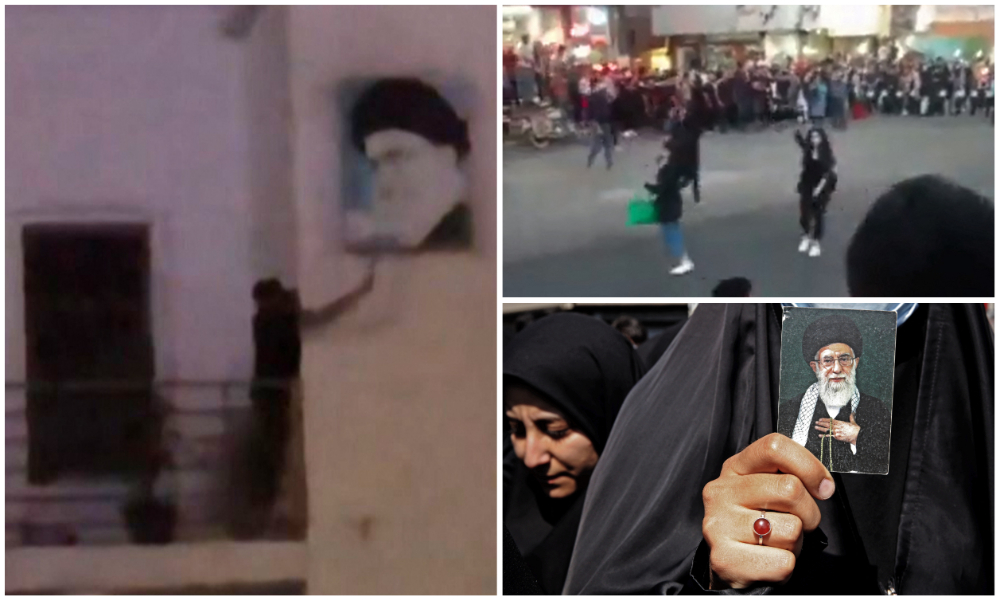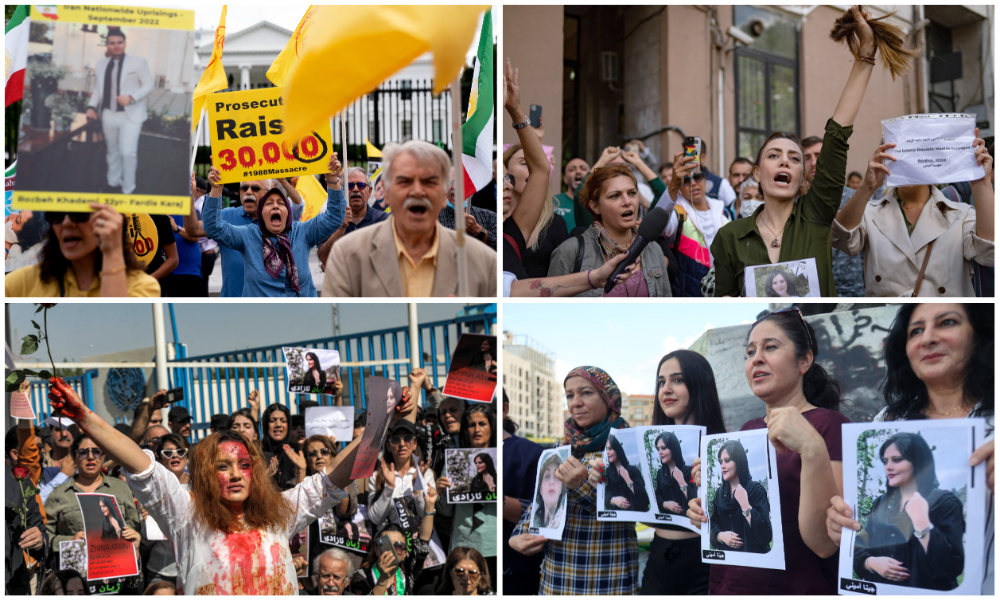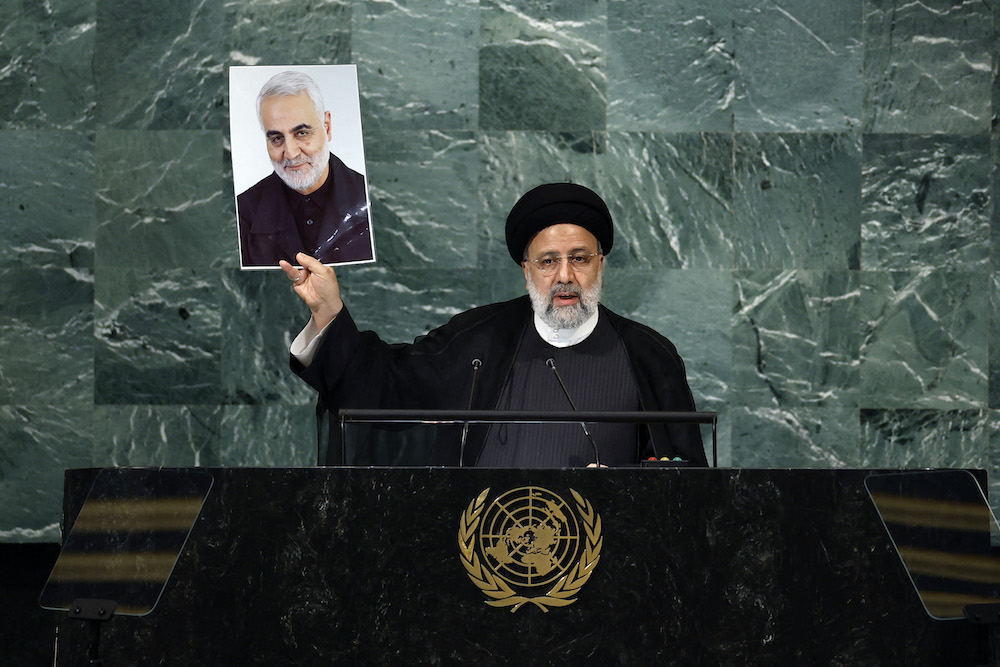DUBAI: Protests have spread to almost all of Iran’s 31 provinces and urban cities since the death of 22-year-old Mahsa Amini at the hands of the police. On Sept. 13, Amini was arrested by a morality police (Gasht-e Ershad) patrol in a Tehran metro station, allegedly for violating the Islamic Republic’s strict dress code.
She was hospitalized after the arrest, fell into a coma and died three days later. Iranian authorities maintain that she died of a heart attack. Her family says that she had no pre-existing heart conditions.
Her death has sparked outrage in a country seething with anger over a long list of grievances and a wide range of socio-economic concerns.
State media reported Monday that authorities in a northern Iran province have arrested 450 people during more than 10 days of protests.
“During the troubles of the past days, 450 rioters have been arrested in Mazandaran,” the northern province’s chief prosecutor, Mohammad Karimi, was quoted as saying by official news agency IRNA.
On Saturday, authorities in the neighboring Guilan province announced the arrest of 739 people, including 60 women.
Iranian women, fed up with the morality police’s heavy-handed approach, have been posting videos of themselves online cutting locks of their hair in support of Amini. Protesters who have taken to the streets have been chanting “Death to the moral police” and “Women, life, freedom.”
In acts of defiance, female demonstrators can be seen taking off their headscarves, burning them and dancing in the streets. State police have been cracking down on the protesters by attacking them with tear gas while volunteers from the Islamic Revolutionary Guard Corps have been beating them. At least 41 people have died so far.

“The internet in Tehran has been cut off. I have not been able to reach family members, but every now and then they are able to get a message through,” an Iranian man who fled to the US during the days of the Islamic Revolution, told Arab News.
Mehdi, who did not want to give his full name, added: “We are hopeful that the government will offer concessions this time. It has been the biggest demonstration since the revolution. We take pride in what is happening in Iran.”
Writing in The Washington Post, Karim Sajdadpour, a senior fellow at the Carnegie Endowment for International Peace, described the protests against the killing of Amini as “led by the nation’s granddaughters against the grandfathers who have ruled their country for over four decades.”
Since the Islamic Revolution in 1979, Sharia laws in the country require women to wear headscarves and loose garb in public. Those who do not abide by the code are fined or jailed.
Iranian authorities’ campaign to make women dress modestly and against the wearing of mandatory clothing “incorrectly” began soon after the revolution, which ended an era of unfettered sartorial freedom for women under Shah Mohammad Reza Pahlavi. During the shah’s rule, his wife Farah, who often wore Western clothing, was held up as a model of a modern woman.
ALSO READ: Iran’s malign theocracy is unraveling before our eyes

The image of protesters destroying portraits of Iranian leaders in the northern city of Sari is just one of many emerging from Iran over the past week in a symbol of anti-regime sentiment. (AFP)
By 1981, women were not allowed to show their arms in public. In 1983, Iran’s parliament decided that women who did not cover their hair in public could be punished with 74 lashes. In recent times, it added the punishment of up to 60 days in prison.
Restrictions kept evolving, and the extent of enforcement of the female dress code has varied since 1979, depending on which president was in office. The Gasht-e Ershad was formed to enforce dress codes after Mahmoud Ahmadinejad, the ultraconservative mayor of Tehran, became president in 2005.
The restrictions were eased a little under the presidency of Hassan Rouhani, who was considered a relative moderate. After Rouhani accused the morality police of being aggressive, the head of the force declared in 2017 women violating the modesty code would no longer be arrested.
However, the rule of President Ebrahim Raisi appears to have emboldened the morality police once again. In August, Raisi signed a decree for stricter enforcement of rules that require women to wear hijabs at all times in public.
In his speech at the UN General Assembly last week, Raisi tried to deflect blame for the protests in Iran by pointing to Canada’s treatment of indigenous people and accused the West of applying double standards when it comes to human rights.
When I look at how the women are standing up to the vicious regime that never shied away from genocide, it gives me goosebumps.
Mehdi, who fled to the US during the Islamic Revolution
Raisi’s government, meanwhile, is seeking some form of guarantee whereby the lifting of severe sanctions and resumed business activities by Western firms cannot be disrupted if a future US president rescinds the 2015 nuclear deal. Iranian officials also dispute the concerns of the International Atomic Energy Agency about illicit nuclear material found at three sites and want the IAEA’s investigation to close.
Be that as it may, anti-government protests in Iran are not new. In 2009, the Green Movement held protests over election results believed to be fraudulent. In 2019, there were demonstrations over a spike in fuel prices and deteriorating standard of living conditions and basic needs.
This year’s protests are different in that they are feminist in nature. Firuzeh Mahmoudi, executive director of United for Iran, a human rights NGO, said it is unprecedented for the country to see women taking off their hijabs en masse, burning police cars and tearing down pictures of Ayatollah Ali Khamenei (the country’s supreme leader).
It is also unprecedented to see men chant “We’ll support our sisters and women, life, liberty.”
“Through social media, mobile apps, blogs and websites, Iranian women are actively participating in public discourse and exercising their civil rights,” Mahmoudi said. “Luckily for the growing women’s rights movements, the patriarchal and misogynistic government has not yet figured out how to completely censor and control the internet.”

Protests against the death of Mahsa Amini have erupted across Iran, and among the diaspora living around the world. (AFP)
Masih Alinejad, an Iranian political activist who has been living in exile in America since 2009, said that she has been receiving many messages from women in Iran. They have been sharing with her their frustrations, videos of the protests, and their goodbyes to their parents, which they believe might be for the last time.
Declaring that she can feel their anger through their messages, Alinejad said the hijab is a way for the government to control women and therefore society, adding that “their hair and their identity have been taken hostage.”
Scores of Iranian male celebrities have also voiced their support of the protests and women. Toomaj Salehi, a dissident rapper who was arrested earlier this year because of his lyrics on regime change and social and political issues, posted a video of himself walking through the streets saying: “My tears don’t dry, it’s blood, it’s anger. The end is near, history repeats itself. Be afraid of us, pull back, know that you are done.”
For its part, the movie industry released a statement on Saturday calling on the military to drop their weapons and “return to the arms of the nation.”
A number of famous actresses have taken off their hijab in support of the movement and the protests. Mohammad Mehdi Esmaili, Iran’s culture minister, said that actresses who voiced their support online and removed their hijabs can no longer pursue their careers.
In a tweet on Saturday, Sajdadpour said: “To understand Iran’s protests it’s striking to juxtapose images of the young, modern women killed in Iran over the last week (Mahsa Amini, Ghazale Chelavi, Hanane Kia, Mahsa Mogoi) with the images of the country’s ruling elite, virtually all deeply traditional, geriatric men.”

Iranian President Ebrahim Raisi holds up a photo of Quds Force Commander General Qassem Soleimani, who was killed in a U.S. attack, during his remarks at the 77th session of the United Nations General Assembly. (AFP)
Iranian authorities have shut down mobile internet connections, disrupting WhatsApp and Instagram services. On Iranian state media, ISNA, Issa Zarepour, minister of communications, justified the act for “national security” and said it was not clear how long the blocks on social media platforms and WhatsApp would continue, as it was being implemented for “security purposes and discussions related to recent events.”
However, Mahsa Alimardani, an academic at the Oxford Internet Institute who studies Iran’s internet shutdowns and controls, said the authorities are targeting these platforms because they are “lifelines for information and communication that’s keeping the protests alive.”
On Twitter, the hashtag #MahsaAmini in Farsi has exceeded well over 30 million posts.
“Everyone in Iran knows that the authorities will crack down very hard on the protesters and kill them,” Mehdi, the US-based Iranian, told Arab News.
“It’s almost target practice for them. When I look at how the women there are standing up to the ruthless and vicious regime that never shied away from genocide to maintain their power, it gives me goosebumps. It takes a certain courage to do what they are doing.”
Looking forward to the future with hope, he said: “The flame has been ignited and we are not the kind of people who back out.”


























